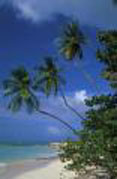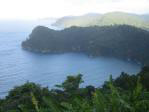
The Actual Interview of The Father and The Mother:
I was born in
Deigo Martin, Trinidad (says the father). We moved here because the
fatherís mother had retired and wanted them to come here to the US. His
mother is a US citizen. Well we came here for a better life (says the
father).

My father (says the father) was a sales man who worked in the naval base in WWII. There were bases in Trinidad at that time because of the oil and they used the island as a refueling station.
Trinidad has always been protected by the British and Americans (says the father). It is an island that is easy to protect because you have the mountains on one side so only part of the island needs to be guarded. My father (says the father) got to know the American life. He was a successful salesman, he would travel to the US consistently and many times visited New York.
He applied for a visa to open a business and was able to obtain it he also got a green card. My father moved the whole family to Brooklyn, New York. There he opened a restaurant called The West Indian Roti Shop, it was a Caribbean restaurant. He had that restaurant for 12 years. After that time he got sick and sold the restaurant and went back to Trinidad. My mother and siblings stayed in New York.
I stayed
in Trinidad to study. I had a scholarship that was paying for my
education and at that time life in Trinidad was good. After I graduated
I became an insurance broker. I had a good job and a good life.

 As I
said Trinidad was a very wealthy country. In the 70ís there was a lot of
oil and life was safe and secure. After the independence from Great
Britain the price of oil went up which meant that there was more money
in the island. The power shifted from the whites to the blacks (says the
father) and much of the infrastructure was lost. In Trinidad we had
workers from Grenada (like the US has Mexicans to work for cheap labor).
Per capita income was the 3rd in the world at this time. But
then with money came corruption.
As I
said Trinidad was a very wealthy country. In the 70ís there was a lot of
oil and life was safe and secure. After the independence from Great
Britain the price of oil went up which meant that there was more money
in the island. The power shifted from the whites to the blacks (says the
father) and much of the infrastructure was lost. In Trinidad we had
workers from Grenada (like the US has Mexicans to work for cheap labor).
Per capita income was the 3rd in the world at this time. But
then with money came corruption.
In the early eighties the production of oil declined and that is when life in Trinidad started to change. When I was growing up (says the father) we could leave the house unlocked for days and nobody would go in. After the oil declined the crime rate went up. We had to start putting metal bars around the windows so people would not go in and rob your house.
In my mid 30ís I had already traveled to New York various times to visit my family. I did not like New York. I liked the US but not New York. After my mother retired she moved to Florida. At that Time I saw that the future for my children was not secure in Trinidad. They would lack security, education was not very good and there future seemed uncertain. So my mother petitioned me and I moved to Florida with my family. K (my classmate) was two at the time and we had another child in the US (the baby) (They already had 4 other children).
After I left Trinidad (says the father) I had no more family in Trinidad. I only a couple uncles but my direct family was in Florida. When we moved here I didnít have any money. I lived with my sister for 10 months. At the time the real state market collapsed in Trinidad and I had to sell the house. Once I came here I experienced some culture shock. My first experience was when I needed a car. I went to a car dealership and saw the price tag on the vehicle. It said $2400. As I stared I knew I didnít have enough, I only had $1200 with me. The salesman approached me and said if he could help me. I said no thank you, as I was getting ready to leave he asked me where I was from? I told answered him that I was from the Caribbean.
He sort of knew some aspects of my culture. In Trinidad we donít bargain like you do here. Over there if there is a price tag on something that is the price you pay, so I was not going to start making the salesman an offer. He told me to wait and asked me how much money I had. I told him $1200 dollars. He left and talked to the manager, when he came back he told me I could take the care for $1200. I was surprised at what just had happened.
Another example of culture shock was one day that my boss invited me to eat. We went to eat hamburgers and then it surprised me that they were eating with there hands. I said how could my boss be eating with his hands. In Trinidad we eat with fork and knife, even our pizza and hamburger.
I still have my family in Trinidad (says the mother). My mother, brother and sister live there. I visited last year in February and 5 months before that I had gone too. I miss my family the food and coconuts. The food there is great, there are many different cultures that melt together in the cuisine.
What I
miss the most is going fishing and green coconut water with scotch. It
is really good. I also miss the part of our culture that when there is a
party it takes place mostly in t he kitchen, prepa
he kitchen, prepa ring the food for the
party. Here in the US when they invite you to a party everything is done
for you. The food is prepared and you just go and socialize. In Trinidad
you start to prepare the food when your guests arrive and they help out.
It is something that brings every one together. Most of the party takes
place in the kitchen. The one thing that I donít like about the US is
the attitude that the US has. As if portraying an image of we are better
than everyone else.
ring the food for the
party. Here in the US when they invite you to a party everything is done
for you. The food is prepared and you just go and socialize. In Trinidad
you start to prepare the food when your guests arrive and they help out.
It is something that brings every one together. Most of the party takes
place in the kitchen. The one thing that I donít like about the US is
the attitude that the US has. As if portraying an image of we are better
than everyone else.